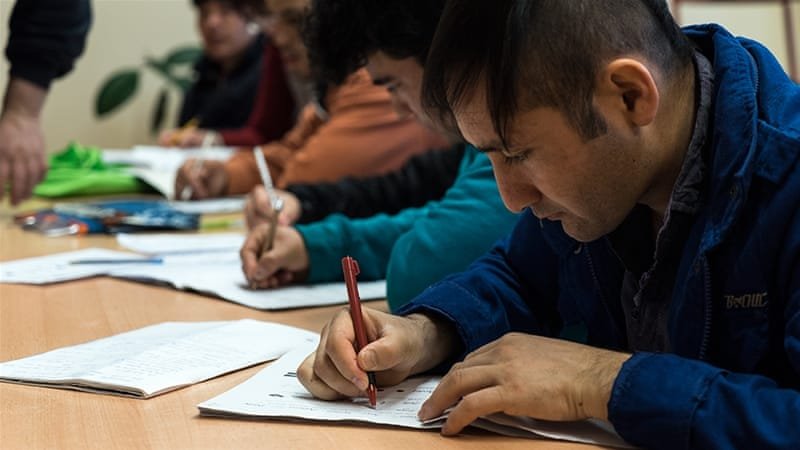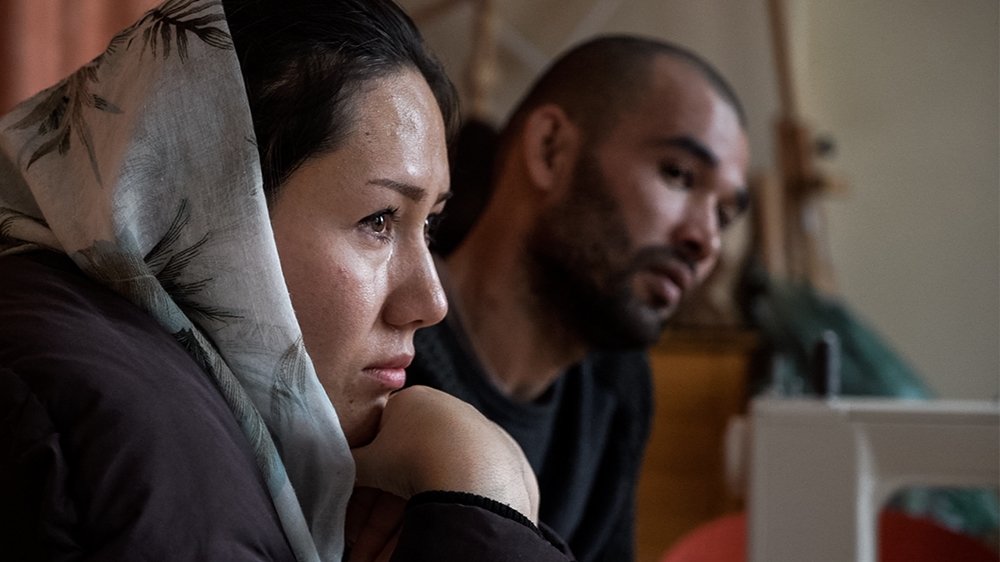
Patrick Strickland | Aljazeera
Berlin, Germany – Jawad Jafari and his wife Masoomi start crying almost simultaneously as they recall their departure from Iran and the lengthy voyage that culminated in a refugee camp in the Prenzlauer Berg area of Berlin.
Jawad, 31, and Masoomi, 26, were both born in Iran to Afghan parents who had been driven from their country during the Soviet occupation of Afghanistan during the 1980s.
Asked why he left Iran, Jawad replies: “How do I explain 31 years of problems?”
Iran hosts some three million Afghan refugees, many of whom have poured into the country since the United States-led invasion in 2001. However, only an estimated 950,000 are United Nations-registered, as Iranian authorities have not provided all Afghan refugees with an opportunity to legally claim asylum.
Those born in the country are afforded UN-recognised refugee status, but they hold only a fraction of the rights granted to Iranian citizens. Many live without residency documents and are forced to exist off the grid, making their living from the black market.
“For Afghans, there is no chance for a future in Iran,” Jawad says. “For the Iranian government, it wasn’t enough that we are Muslims like them. I had to pay bribes to work, and the police were always harassing me.”
“We were both born in Iran, but neither of us has documents,” his wife Masoomi explains. “We don’t want our children to face the same problems and racist treatment.”

Feeling mistreated in Iran
Human Rights Watch (HRW) and other watchdog organisations have accusedthe Iranian government of severe maltreatment of Afghans, including summary deportations, physical abuse at the hands of security forces, limited job opportunities outside menial labour, and restricted access to education.
“Many Afghans were being deported and coming back illegally,” Masoomi says. “We saw it happening a lot to people we know.”
Afraid that this might happen to them, they fled. With their two small children, they passed through Turkey, Greece, Macedonia, Serbia, Croatia, Slovenia and Austria before arriving in Germany in December.
The family traversed mountains on foot along the Iran-Turkey border, dodging gun-toting guards along the way. At the Turkish Aegean coast, they climbed aboard a decrepit dinghy along with dozens of refugees fleeing violence in Syria and Iraq.
Jawad pauses and reaches over to wipe tears from his wife’s cheek. “The water was filling our boat. The children were crying and begging us to go back to Iran,” he recalls.
Forced to fight in Syria
More than a million refugees and migrants crossed the Mediterranean by boat in 2015, according to the UN refugee agency, UNHCR. More than 3,700 died when their boats capsized.
Despite the European Union’s deployment of warships in the Mediterranean to stem the flow of boats, bodies have continued to wash up on European shores this year. In April, up to 500 people may have died when their boat sank en route to Italy from Libya, according to the UN.
Now in Germany, Jawad and Masoomi take daily German lessons and hope to obtain asylum. However, the EU had drafted a plan to send 80,000 Afghan refugees back to their war-torn country in April, and today, the fate of Europe’s Afghan refugees remains unclear as EU regulations continue to tighten for asylum seekers.
Furthermore, HRW reported earlier this year that Iran has been recruiting thousands of Afghan refugees to fight in pro-government armed groups in neighbouring Syria.
The group said that many had been coerced into fighting, while some had been deported to Afghanistan as punishment for refusing. Others were offered residency papers and financial incentives in exchange for taking up arms in Syria.
Iran’s foreign ministry has denied allegations that the refugees were coerced in the past, claiming instead that the refugees have volunteered to fight in Syria out of political or religious convictions.
‘We cannot live like humans here’
Patricia Gossman, an Afghanistan senior researcher for HRW, told Al Jazeera that Afghans face discrimination in several areas, including restrictions on travel and freedom of movement, legal barriers to claiming asylum and limited access to humanitarian aid, among other things.
In mid-April, the EU announced an additional 16.5m euros (around $18.7m) in aid to Iran to boost the government’s capacity for assisting Afghan refugees.
Noting that the Iranian government has responded positively in some respects, Gossman says HRW has encouraged the international community to provide more aid.
“Assistance is of course needed and helps,” she says, explaining that it can improve refugees’ “access to education and healthcare.”
“But – like refugees everywhere – Afghans are likely to continue to experience hardships in Iran.”
Niloofer, a 17-year-old who was born in Tehran, went to Kabul with her family in mid-2015 after her father faced legal repercussions from the Iranian government for working without proper documents.
Once back in Afghanistan, she claims that her parents received death threats from the Taliban after they refused to hand Niloofer and one of her three sisters over to be married to fighters. Knowing a return to Iran would only result in more hardship for the family, after only seven months in Afghanistan, the family of six set off for Germany.
Niloofer has always dreamed of obtaining a university degree, a feat that would be nearly impossible in Iran.
“[In Iran], we cannot go to school [university] or buy a house,” she says.
As her family awaits a response to their asylum application, Niloofer hopes to enrol at a university in Berlin to study dentistry.
‘Dreaming of human rights’
Hamid, 26, was born as a refugee in Iran. He says that he had to become a refugee twice over to find hope for his future.
“I see the situation in Germany as good compared to ours in Afghanistan. Some people ask me if Iran is safe. They say nobody is shooting us in Iran. That’s true, but we cannot live like humans there,” he says.
“I don’t want to say what happened to me in Iran; I don’t want to speak about my experience,” he adds, explaining that many refugees endure trauma that they struggle to express even long after arriving in Europe.
Without an identification card and unable to continue his studies after completing high school, he decided to leave the country in early 2016. “I am sure I will never go back to Iran, even if they deport me from Germany,” he says.
“The Iranian government didn’t treat us like humans – we couldn’t go to the hospital with insurance,” he recalls. “Maybe there are a lot of things wrong in Germany, but I am trying to see a new world. I’m here now. My first dream is to have human rights.”

